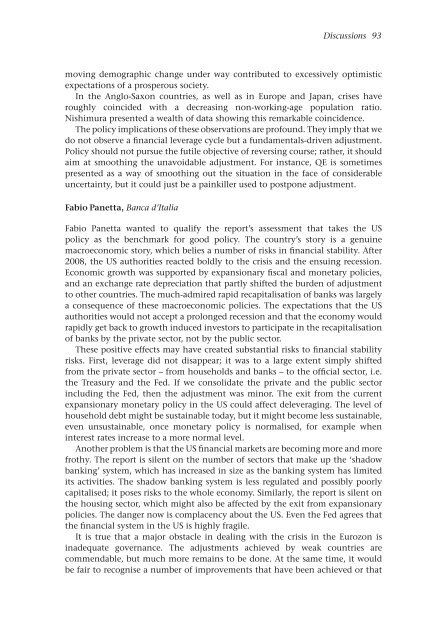1qGLG9p
1qGLG9p
1qGLG9p
Create successful ePaper yourself
Turn your PDF publications into a flip-book with our unique Google optimized e-Paper software.
Discussions 93<br />
moving demographic change under way contributed to excessively optimistic<br />
expectations of a prosperous society.<br />
In the Anglo-Saxon countries, as well as in Europe and Japan, crises have<br />
roughly coincided with a decreasing non-working-age population ratio.<br />
Nishimura presented a wealth of data showing this remarkable coincidence.<br />
The policy implications of these observations are profound. They imply that we<br />
do not observe a financial leverage cycle but a fundamentals-driven adjustment.<br />
Policy should not pursue the futile objective of reversing course; rather, it should<br />
aim at smoothing the unavoidable adjustment. For instance, QE is sometimes<br />
presented as a way of smoothing out the situation in the face of considerable<br />
uncertainty, but it could just be a painkiller used to postpone adjustment.<br />
Fabio Panetta, Banca d’Italia<br />
Fabio Panetta wanted to qualify the report’s assessment that takes the US<br />
policy as the benchmark for good policy. The country’s story is a genuine<br />
macroeconomic story, which belies a number of risks in financial stability. After<br />
2008, the US authorities reacted boldly to the crisis and the ensuing recession.<br />
Economic growth was supported by expansionary fiscal and monetary policies,<br />
and an exchange rate depreciation that partly shifted the burden of adjustment<br />
to other countries. The much-admired rapid recapitalisation of banks was largely<br />
a consequence of these macroeconomic policies. The expectations that the US<br />
authorities would not accept a prolonged recession and that the economy would<br />
rapidly get back to growth induced investors to participate in the recapitalisation<br />
of banks by the private sector, not by the public sector.<br />
These positive effects may have created substantial risks to financial stability<br />
risks. First, leverage did not disappear; it was to a large extent simply shifted<br />
from the private sector – from households and banks – to the official sector, i.e.<br />
the Treasury and the Fed. If we consolidate the private and the public sector<br />
including the Fed, then the adjustment was minor. The exit from the current<br />
expansionary monetary policy in the US could affect deleveraging. The level of<br />
household debt might be sustainable today, but it might become less sustainable,<br />
even unsustainable, once monetary policy is normalised, for example when<br />
interest rates increase to a more normal level.<br />
Another problem is that the US financial markets are becoming more and more<br />
frothy. The report is silent on the number of sectors that make up the ‘shadow<br />
banking’ system, which has increased in size as the banking system has limited<br />
its activities. The shadow banking system is less regulated and possibly poorly<br />
capitalised; it poses risks to the whole economy. Similarly, the report is silent on<br />
the housing sector, which might also be affected by the exit from expansionary<br />
policies. The danger now is complacency about the US. Even the Fed agrees that<br />
the financial system in the US is highly fragile.<br />
It is true that a major obstacle in dealing with the crisis in the Eurozon is<br />
inadequate governance. The adjustments achieved by weak countries are<br />
commendable, but much more remains to be done. At the same time, it would<br />
be fair to recognise a number of improvements that have been achieved or that


